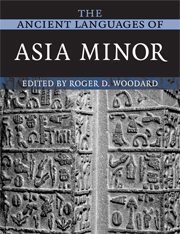Book contents
- Frontmatter
- Contents
- List of figures
- List of tables
- List of maps
- List of contributors
- Notes on numbering and cross-referencing
- List of abbreviations
- Preface
- Preface to the first edition
- 1 Language in ancient Asia Minor: an introduction
- 2 Hittite
- 3 Luvian
- 4 Palaic
- 5 Lycian
- 6 Lydian
- 7 Carian
- 8 Phrygian
- 9 Hurrian
- 10 Urartian
- 11 Classical Armenian
- 12 Early Georgian
- Appendix 1 The cuneiform script
- Appendix 2 Full tables of contents from The Cambridge Encyclopedia of the World's Ancient Languages, and from the other volumes in the paperback series
- Index of general subjects
- Index of grammar and linguistics
- Index of languages
- Index of named linguistic laws and principles
- Map 1 The ancient languages of Anatolia and surrounding regions
6 - Lydian
Published online by Cambridge University Press: 22 September 2009
- Frontmatter
- Contents
- List of figures
- List of tables
- List of maps
- List of contributors
- Notes on numbering and cross-referencing
- List of abbreviations
- Preface
- Preface to the first edition
- 1 Language in ancient Asia Minor: an introduction
- 2 Hittite
- 3 Luvian
- 4 Palaic
- 5 Lycian
- 6 Lydian
- 7 Carian
- 8 Phrygian
- 9 Hurrian
- 10 Urartian
- 11 Classical Armenian
- 12 Early Georgian
- Appendix 1 The cuneiform script
- Appendix 2 Full tables of contents from The Cambridge Encyclopedia of the World's Ancient Languages, and from the other volumes in the paperback series
- Index of general subjects
- Index of grammar and linguistics
- Index of languages
- Index of named linguistic laws and principles
- Map 1 The ancient languages of Anatolia and surrounding regions
Summary
HISTORICAL AND CULTURAL CONTEXTS
The land called Lydia in Greek sources lay during the first millennium BC on the west central coast of Anatolia, centering on the River Hermos (modern Gediz), with its capital at Sardis (near modern Turgutlu). The indigenous language is attested in graffiti and on coins from the end of the eighth or beginning of the seventh century down to the third, but well-preserved inscriptions of significant length are presently limited to the fifth and fourth centuries, during the period of Persian domination. Lydian texts are thus effectively contemporaneous with those in Lycian.
Extant Lydian texts now number slightly over one hundred, but fewer than thirty of these consist of more than a few words and are reasonably complete. Aside from coins, graffiti, and very short inscriptions on various objects, the overwhelming majority of the inscriptions are on stone. The bulk of these are sepulchral in content, but several of the texts are decrees of one sort or another. Some half-dozen texts are in verse, with a stress-based meter and vowel assonance at line end (see Eichner 1986a and 1993:114ff., with references). All but a handful of the Lydian texts have been found in or near Sardis. For several isolated finds much farther afield see Gusmani 1995:9f. One short Lydian–Aramaic bilingual text helped establish the rudiments of Lydian grammar, but no extensive Lydian–Greek bilingual comparable to the Létôon Trilingual for Lycian (see Ch. 5, §1) has yet come to light.
- Type
- Chapter
- Information
- The Ancient Languages of Asia Minor , pp. 56 - 63Publisher: Cambridge University PressPrint publication year: 2008



